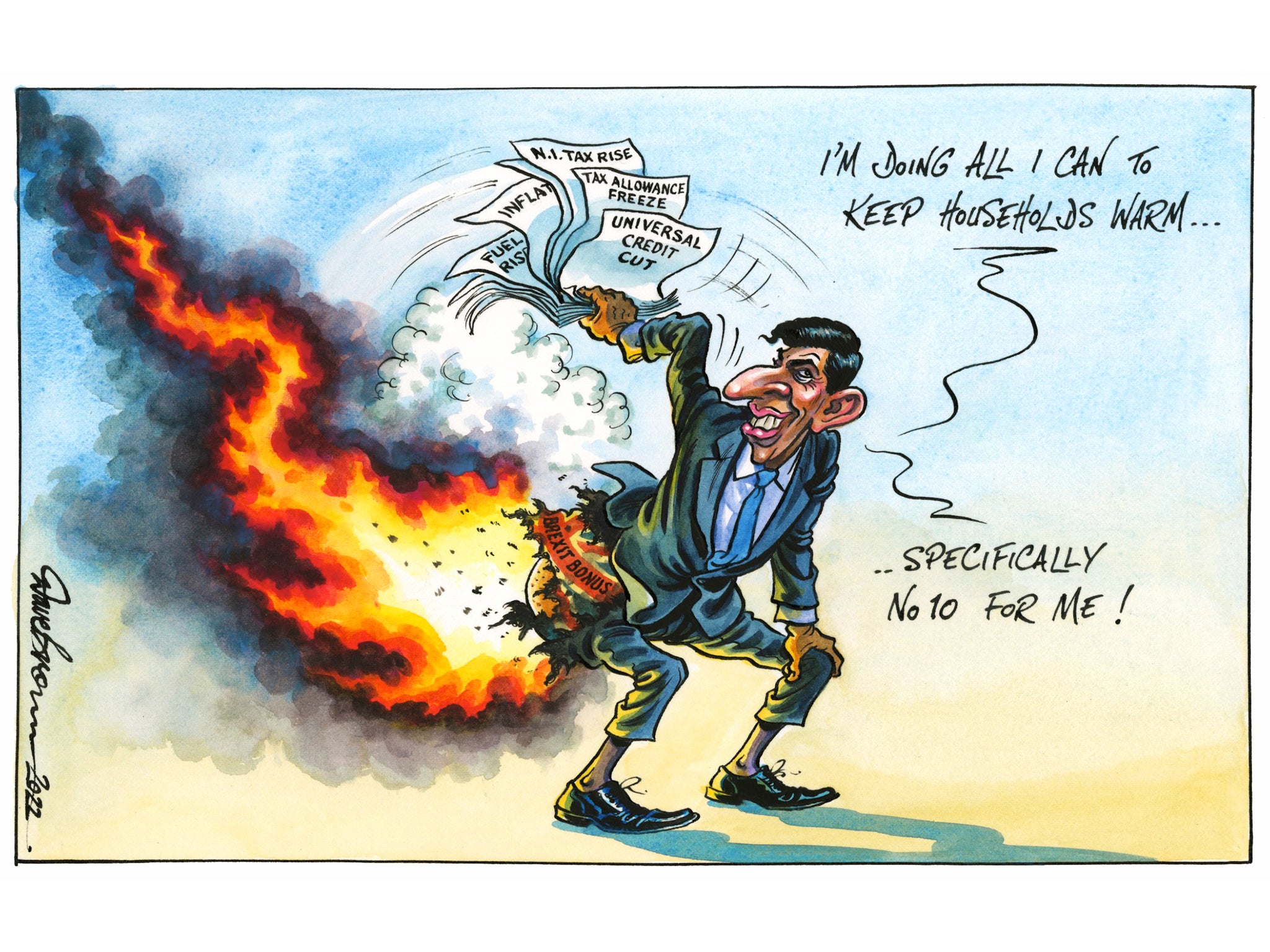The Treasury’s cost-of-living crisis measures are insufficient – but so are Labour’s plans
Editorial: Even with the government’s various discounts, allowances and ‘buy now, pay later’ schemes, many families will have to find hundreds if not thousands of pounds extra to keep a warm roof over their heads

Even on the most generous assumptions about the chancellor’s package of measures to ameliorate the imminent hike in energy bills, virtually every household in the country will be paying something more for gas and electricity use over the coming year – and possibly longer.
With general inflation predicted to exceed 7 per cent and a rise in national insurance contributions coming this April, it will still mean the worst squeeze on living standards in at least 30 years, and certainly one of the worst hits on households since the end of the Second World War. It makes the prime minister’s restlessly upbeat, boosterish and boastful speeches sound increasingly out of touch.
As if to emphasise what is about to befall the nation, the Bank of England announced a rise in interest rates on the very day that the fuel price cap was raised and average bills were projected to go up by about £700. Even with the various discounts, allowances and “buy now, pay later” schemes from the Treasury, many families will have to find hundreds if not thousands of pounds extra to keep a warm roof over their heads.
In principle, the Treasury was smart to seek to smooth the rise in bills, rather than attempt, artificially and indefinitely, to insulate consumers from the global trend in the price of all hydrocarbons. As has been well noted, a 40 per cent-plus rise in gas prices is primarily a consequence of post-Covid adjustments, and should subside.
That being the case, it makes sense for the Treasury to, in effect, lend consumers the money at zero interest to cushion the blow, repayable over five years, and to offer a one-off rebate on most council tax bills and what looks to be a modest increase in the Warm Home discount scheme via local authorities for the least well off.
Nonetheless, it is poorly targeted, and arguably just as unsatisfactory as Labour’s proposal to reduce VAT on energy bills from 5 per cent to zero, a measure that richer people in mansions would find most helpful. Of the two competing packages, Rishi Sunak’s makes for the more convincing – if still crude – attempt to ensure the poorest are at least partially protected. The fact that Rachel Reeves’s proposal would be funded by the supernormal profits of the oil giants isn’t that much use to those in fuel poverty, as it’s not exactly something they can chuck in a log burner.
Mr Sunak, and presumably Boris Johnson, seem to have been careful – and cynical – in moderating the help they give to the very poorest, who tend not to be Tory, and offering proportionately more to those on middle incomes, the types of voters that they are at risk of losing to the opposition parties. Meanwhile, it is at least worth mentioning the plight of rural communities who rely on fuel oil for heating, where there is no price cap, no official support, and not much interest from either party. They are not all gentry.
The cost-of-living crisis is broad, and, as the activist Jack Monroe and others point out, only partially captured in official data on inflation. The simplest way of protecting those who need help most from escalating bills, whether it’s for the gas, a bag of value brand pasta or an older used car, is to boost universal credit and take more people out of tax and national insurance at lower income levels.
The problem in the UK is that the tax base is so narrow that it means middle earners pay more than they should, and those who, for example, make vast personal windfall profits from successive property booms pay precisely nothing on the hundreds of thousands or millions of pounds they make or pass on, given the large inheritance tax allowances.
As ever, the super-rich also appear triple vaccinated against tax, and the digital giants pay corporation tax on virtually a voluntary basis. At last the shadow chancellor seems more alert than the government to the inequalities built into the current system.
To keep up to speed with all the latest opinions and comment, sign up to our free weekly Voices Dispatches newsletter by clicking here
Ms Reeves and the shadow chief secretary to the Treasury, the appropriately austere Pat McFadden, may not have entirely thought through the redistributive impact of cutting VAT on fuel for the people in the big houses, but more generally they are disproving the prime minister’s jibe that Labour doesn’t have a plan. The shadow Treasury team does, not least highlighting waste and corruption. Their diagnosis of the root cause of the squeeze on living standards – years of poor productivity growth and weak investment – is also sound, though they understandably choose not to bang on about Brexit in that context.
Politically, this is obviously not a great era to be in government, and, given the prime minister’s abysmal ratings, Labour could be forgiven for just relaxing and watching the Conservatives destroy themselves. Keir Starmer and his colleagues, though, seem to understand that disillusionment with the Conservatives is only part of their revival – it’s necessary but not sufficient.
Ms Reeves and Mr McFadden will need many more (and more convincing) plans to fix the economy as the next election approaches. They’ll need to answer the question: “What would you do?”






Join our commenting forum
Join thought-provoking conversations, follow other Independent readers and see their replies
Comments